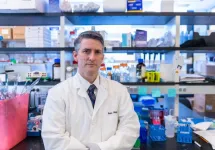(Press-News.org) A new ancient species of snake dubbed Vasuki Indicus, which lived around 47 million years ago in the state of Gujarat in India, may have been one of the largest snakes to have ever lived, suggests new research published in Scientific Reports. The new species, which reached an estimated length of between 11 and 15 metres, was part of the now extinct madtsoiidae snake family, but represented a distinct lineage that originated in India.
Debajit Datta and Sunil Bajpai describe a new specimen recovered from the Panandhro Lignite Mine, Kutch, Gujarat State, India, which dates to the Middle Eocene period, approximately 47 million years ago. The new species is named Vasuki Indicus after the mythical snake round the neck of the Hindu deity Shiva and in reference to its country of discovery, India. The authors describe 27 mostly well-preserved vertebra, some of which are articulated, which appear to be from a fully-grown animal.
The vertebrae measure between 37.5 and 62.7 millimetres in length and 62.4 and 111.4 millimetres in width, suggesting a broad, cylindrical body. Extrapolating from this, the authors estimate that V. Indicus may have reached between 10.9 and 15.2 metres in length. This is comparable in size to the longest known snake to have ever lived, the extinct Titanoboa, although the authors highlight the uncertainty around these estimates. They further speculate that V. Indicus’s large size made it a slow-moving, ambush predator akin to an anaconda.
The authors identify V. Indicus as belonging to the madtsoiidae family, which existed for around 100 million years from the Late Cretaceous to the Late Pleistocene and lived in a broad geographical range including Africa, Europe, and India. They suggest that V. Indicus represents a lineage of large madtsoiids that originated in the Indian subcontinent and spread via southern Europe to Africa during the Eocene, approximately 56 to 34 million years ago.
END
Palaeontology: Discovery of new ancient giant snake in India
2024-04-18
ELSE PRESS RELEASES FROM THIS DATE:
Racial discrimination and metabolic syndrome in young Black adults
2024-04-18
About The Study: The findings of this study with 322 participants suggest that racial discrimination predisposes Black young adults to metabolic syndrome via sleep problems and inflammation, which may serve as actionable targets for prevention in minoritized populations that could reduce existing disparities and promote health equity.
Authors: Nia Heard-Garris, M.D., M.B.A., M.Sc., of the Northwestern University Feinberg School of Medicine in Chicago, is the corresponding author.
To access the embargoed study: Visit our For The Media website at this link https://media.jamanetwork.com/
(doi:10.1001/jamanetworkopen.2024.5288)
Editor’s Note: Please ...
Adherence to American Cancer Society nutrition and physical activity guidelines among cancer survivors
2024-04-18
About The Study: In this cross-sectional study using data from the Behavioral Risk Factor Surveillance System for 10,000 cancer survivors, only 4% of cancer survivors adhered to all four American Cancer Society nutrition and physical activity guidelines, with the mean number of guidelines met being 2.0. Improved understanding of guideline adherence and its determinants may guide oncologists and general internists in providing recommendations for their patients who have completed cancer treatments.
Authors: Kathryn Norman, M.D., of the Beth Israel Deaconess Medical Center in Boston, is the corresponding author.
To access the embargoed study: Visit our For The ...
New urine-based test detects high-grade prostate cancer, helping men avoid unnecessary biopsies
2024-04-18
ANN ARBOR, Michigan — Researchers at the University of Michigan Rogel Cancer Center have developed a new urine-based test that addresses a major problem in prostate cancer: how to separate the slow-growing form of the disease unlikely to cause harm from more aggressive cancer that needs immediate treatment.
The test, called MyProstateScore2.0, or MPS2, looks at 18 different genes linked to high-grade prostate cancer. In multiple tests using urine and tissue samples from men with prostate cancer, it successfully identified cancers ...
Researchers reduce bias in pathology AI algorithms using foundation models
2024-04-18
Findings of substantial variability in pathology AI models’ performance based on race, insurance type and age group serve as a “call to action” to researchers and regulators to improve medical equity
Large foundation models that incorporate a richer level of detail may mitigate disparities between different demographic groups and enhance model accuracy.
Advanced artificial intelligence (AI) systems have shown promise in revolutionalizing the field of pathology through transforming the detection, diagnosis, and treatment of disease; however, the underrepresentation of certain patient populations in pathology ...
Properties of new materials for microchips can now be measured well
2024-04-18
Making ever smaller and more powerful chips requires new ultrathin materials: 2D materials that are only 1 atom thick, or even just a couple of atoms. Think about graphene or ultra-thin silicon membrane for instance. Scientists at TU Delft have taken an important step in application of these materials: they can now measure important thermal properties of ultrathin silicon membranes. A major advantage of their method is that no physical contact needs to be made with the membrane, so pristine properties can ...
Maltreated children are three times more likely to develop substance use disorders in adulthood
2024-04-18
A new study published in the scientific journal Addiction has found that people who are maltreated as children may be three times more likely to be admitted to hospital for alcohol and substance use disorders by the age of 40, compared with those who are not maltreated.
The study used data from over 6,000 children born at the Mater Mothers Hospital, Brisbane, Australia between 1981 and 1983. Ten percent of those children (609 children) had at least one child maltreatment notification (reported or substantiated) up to 15 years of age. Compared with the rest of the children, those 609 ...
Two U professors selected as AAAS fellows
2024-04-18
University of Utah Health professors Amy Barrios, PhD, and H. Joseph Yost, PhD, have been elected as Fellows of the American Association for the Advancement of Science (AAAS), a lifetime honor that celebrates their excellence in research and commitment to mentoring the next generation of scientists.
Yost and Barrios join a distinguished cadre of AAAS Fellows at the U, including Nancy Songer, PhD; Thure Cerling, PhD; Vahe Bandarian, PhD; Eric W. Schmidt, PhD; Jennifer S. Shumaker-Parry, PhD; and Mario Capecchi, PhD.
Rachel Hess, MD, associate vice president for research at U of U Health, says, ...
Dana-Farber Chief Scientific Officer, Kevin Haigis, PhD, elected as Fellow of the American Association for the Advancement of Science
2024-04-18
Boston - Kevin Haigis, PhD, Chief Scientific Officer, Dana-Farber Cancer Institute, has been named Fellow of the American Association for the Advancement of Science (AAAS). Election as an AAAS Fellow is a distinguished lifetime honor bestowed upon AAAS members by their peers.
Haigis is recognized within Biological Sciences for his distinguished contributions to understanding the complex diversity of cellular dysregulation by different variants of RAS mutations and their consequences in pathophysiology and ...
Siblings with unique genetic change help scientists progress drug search for type 1 diabetes
2024-04-18
Two siblings who have the only known mutations in a key gene anywhere in the world have helped scientists gain new insights that could help progress the search for new treatments in type 1 diabetes.
Type 1 diabetes (also known as autoimmune diabetes) is a devastating and life-long disease, in which the patient’s immune cells wrongly destroy the insulin producing beta cells in the pancreas. People living with autoimmune diabetes need to test their blood sugar and inject insulin throughout their lives to control their blood sugars and prevent complications.
Autoimmune ...
Four MD Anderson researchers elected AAAS Fellows
2024-04-18
HOUSTON ― In recognition of their significant achievements in the realm of cancer care and research, four researchers at The University of Texas MD Anderson Cancer Center have been elected fellows of the American Association for the Advancement of Science (AAAS). This prestigious distinction stands as one of the highest accolades within the scientific research community.
Boyi Gan, Ph.D., Candelaria Gomez-Manzano, M.D., Li Ma, Ph.D., and Sattva Neelapu, M.D., now join this esteemed group of fellows elected by their peers. AAAS’s annual tradition of recognizing leading scientists as fellows dates to 1874. With these newest additions, 68 MD Anderson faculty members ...



